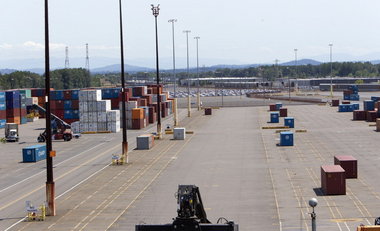forum
library
tutorial
contact

Judge Orders End to Illegal Port of Portland Slowdown
by Associated PressStatesman Journal, July 4, 2012
|
the film forum library tutorial contact |

|
Judge Orders End to Illegal Port of Portland Slowdownby Associated PressStatesman Journal, July 4, 2012 |
 PORTLAND -- A federal judge granted a temporary restraining order that requires longshoremen to end an illegal slowdown that has disrupted shipping at the Port of Portland and forced Northwest businesses to reroute cargo.
PORTLAND -- A federal judge granted a temporary restraining order that requires longshoremen to end an illegal slowdown that has disrupted shipping at the Port of Portland and forced Northwest businesses to reroute cargo.
Judge Michael Simon handed down the 10-day order Tuesday after learning that mediation failed to resolve a dispute between the unions representing longshoremen and electrical workers over duties that amount to two full-time jobs.
Simon noted that 10 days isn't a long time, and he urged the sides to continue negotiations. He said their disagreement will end, one way or another, but the economic damage -- particularly if container shippers decide to permanently skip Portland -- could be indefinite for the parties and the region.
"It really is in your best interests, and the public's, to end it sooner rather than later," he said.
The slowdown led the two main container-shipping lines that serve the port's Terminal 6, Germany's Hapag-Lloyd AG and South Korea's Hanjin, to announce last month they were diverting ships to other ports.
A Hapag-Lloyd ship, however, is scheduled to arrive Wednesday at 4 a.m., and many eyes will be on the dockworkers to see if they engage in delay tactics. If they do not work at full speed, they could be held in contempt of court.
The International Longshore and Warehouse Union declined comment after the ruling.
More than 1,000 businesses, primarily in Idaho, Oregon and Washington, depend on the container terminal to get their goods to or from international markets. When ships are diverted and cargo must be rerouted, that adds costs to shippers and harmful delays to companies importing or exporting seasonal or perishable items.
Simon had twice delayed acting on the National Labor Relations Board's request for a temporary restraining order that would compel dockworkers to speed things up. To help broker a solution, he appointed former Oregon Gov. Ted Kulongoski to mediate.
Kulongoski told the judge Tuesday there wasn't enough time to get all the issues resolved: "I wish that I had a different message to deliver."
The dispute centers on the work of plugging and unplugging refrigerated shipping containers known as reefers, which the electrical workers have maintained for almost 40 years under a deal with the Port of Portland.
The disagreement arose after the Port in 2010 leased Terminal 6 operations to ICTSI Oregon Inc., a subsidiary of a company in the Philippines.
Though the lease states electrical workers should continue performing the work, the longshoremen contend the jobs must switch to them because of the collective bargaining agreement between the ILWU and the Pacific Maritime Association, of which ICTSI is a member.
The electrical workers, ICTSI and the Port of Portland announced Tuesday they will let the longshoremen have the jobs until the National Labor Relations Board, which held a hearing on the matter in May, issues a ruling on which union is entitled to the work.
Ronald Hooks, regional director of the NLRB in Seattle, said a decision from Washington, D.C., could take weeks or months.
Because the longshoremen have the jobs for now, ILWU attorney Rob Remar told the judge that the "underlying cause of the problems has been eliminated," so the request for the temporary restraining order was moot.
But Mara-Louise Anzalone, an NLRB attorney, told the judge to act on the order or risk that the longshoremen will again use coercion to get what they want.
"ICTSI has been forced to do what they have done," she said.
Bill Wyatt, executive director of the Port of Portland, which argued for the restraining order, said the judge's decision does not signal a return to normal shipping schedules for container vessels at Terminal 6.
"No, not necessarily," he said. "They're all going to look at production."
Though Wednesday is the Fourth of July, the longshoremen are scheduled to work and have the Hapag-Lloyd ship unloaded by the end of the day.
Thursday is an official holiday in the union contract, commemorating "Bloody Thursday," the day in which two striking dockworkers were killed by police during the 1934 West Coast waterfront strike.
learn more on topics covered in the film
see the video
read the script
learn the songs
discussion forum
